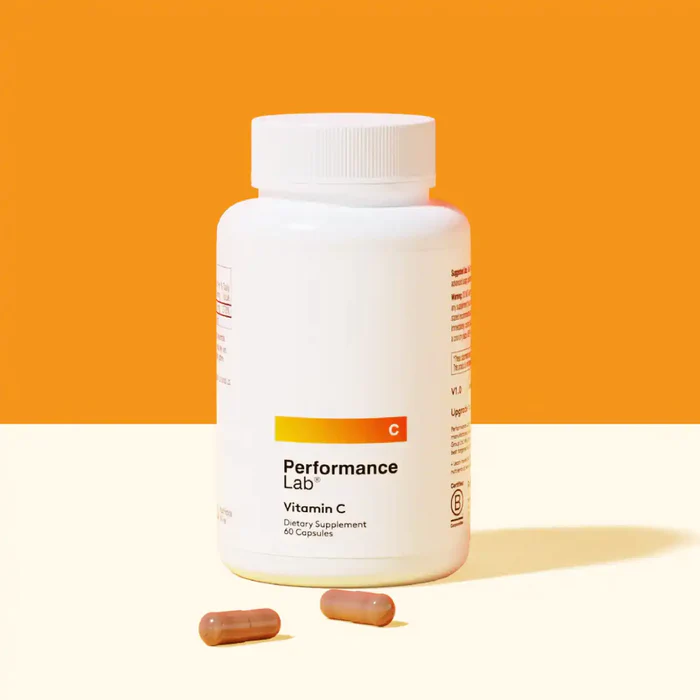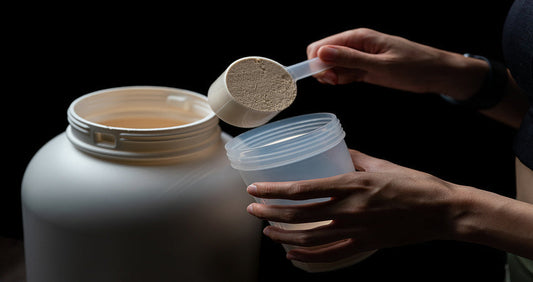Methylsulfonylmethane, more simply known as MSM, is a supplement that’s probably never registered on your radar.
Taken alone, it’s an ultra-powerful nutritional supplement to reduce inflammation and support a faster recovery from exercise because of its high sulfur content, but combining it with vitamin C could supercharge its powers.
Whether you’re dealing with joint pain and stiffness, excessive inflammation, or allergies, there may be a place for MSM in your supplement stack.
In this article, we’re walking you through everything you need to know about MSM and vitamin C and why combining them could provide extra benefit.
Key Takeaways
- Vitamin C and MSM are often paired for connective tissue support and antioxidant defense.
- Take with food if you experience GI sensitivity; split doses for tolerance.
- Hydration helps MSM users avoid minor headaches or stomach upset.
- Quality sourcing and clear dosing matter—avoid megadoses without need.

What is MSM?
Methylsulfonylmethane, more simply known as MSM, is a sulfur-containing compound naturally found in foods like milk, some fruits and vegetables, tea, and coffee(1).
While there are several health benefits related to sulfur, especially MSM, many of its benefits have been attributed to its anti-inflammatory and antioxidant properties.
Although this is getting down to the nitty-gritty, research finds that MSM may inhibit translocation of a specific subunit to the nucleus of nuclear factor (NF)-kß, which reduces the downstream events linked to local and systemic inflammation(1).
On top of that, it can also reduce the expression of pro-inflammatory cytokines, enhance antioxidant defenses via glutathione, and potentially reduce the production of reactive oxygen species (free radicals)(2-4).
MSM has been shown to absorb rapidly within one hour of ingestion and can easily penetrate membranes to permeate throughout several tissues in the body(5). Because of this, the functions of MSM may span several cell types, which makes pinpointing its exact direct and indirect effects difficult.
As always, it is important to note that MSM is not intended to diagnose, treat, cure, or prevent any disease or health condition, and if you have any health concerns, always consult your healthcare provider.
Why Take Vitamin C With MSM?
You’ll often see MSM supplemented alongside vitamin C for one reason—it improves its absorption rate and can therefore produce more potent effects.
Additionally, vitamin C plays a crucial role in collagen synthesis, which is essential for maintaining healthy connective tissues.
But many of the roles of MSM and vitamin C overlap, such an antioxidant and cartilage protection, making them an ideal duo in supplemental form.
A 2008 animal study looked at the benefits of MSM or combined MSM + vitamin C and found that supplementation with both led to more pronounced effects than MSM supplementation alone (6).
But why take MSM in the first place? Find out in the next section!
Health Benefits Of MSM And Vitamin C
1. Arthritis And Inflammation

MSM exhibits potent anti-inflammatory properties that provide benefits for inflammatory conditions like arthritis. Arthritis is an inflammatory condition that affects the joints and is characterized by pain, stiffness, and decreased range of motion due to the presence of pro-inflammatory cytokines.
MSM is used as a sole treatment and in combination with other nutrients (chondroitin, glucosamine, boswellic acid) to treat a number of inflammatory-based conditions.
As mentioned before, the primary mechanism behind MSM’s anti-inflammatory activity is its ability to inhibit NF-kB activity and reduce cytokine expression. And when combined with glucosamine and chondroitin sulfate, it may be effective for reducing C-reactive protein (CRP) in acute and chronic rheumatoid arthritis(7).
In humans, most studies on the efficacy of MSM for joint conditions are subjective, but the results are still positive. They’ve found that MSM can reduce levels of pain, pain intensity, swelling, and stiffness(5, 8).
MSM has also been shown to be effective in other inflammatory conditions such as colitis, lung injury, rhinitis, and exercise-induced inflammation.
2. Cartilage Preservation

Cartilage is the main type of connective tissue found through the body, especially within joints to reduce friction and provide cushion to protect against weight-bearing stresses. Maintaining healthy cartilage is crucial for overall joint health, preventing pain and stiffness associated with conditions like osteoarthritis.
Cartilage degradation has been thought to be heavily involved in the pathogenesis of osteoarthritis, which leads to pain and stiffness in the joints due to insufficient protection.
However, because both MSM and vitamin C exhibit protective effects on cartilage and support the production of collagen and proteoglycan, both of which are important components of joint cartilage, they can help to maintain proper joint function.
Articular cartilage is characterized by a dense extracellular matrix (ECM) with no blood supply. As a result, nutrients are obtained from adjacent synovial fluid.
Pro-inflammatory cytokines like IL-1β and TNF-α have been labeled as the major destructive compounds contributing to cartilage loss in the ECM, but MSM could exhibit protected effects on cartilage by suppressing the effects of IL-1β and TNF-α 5, thereby preventing degradation.
3. Enhance Athletic Recovery And Reduce Exercise Induced Muscle Damage

Prolonged exercise is known to trigger delayed onset muscle soreness (DOMS) in the few days after strenuous exercise. It happens because of microtrauma to muscles and surrounding connective tissue that triggers a local inflammatory response(9).
Because of its anti-inflammatory effects and possible contribution to connective tissue generation, MSM has been shown to be effective against muscle soreness.
MSM and vitamin C supplementation can reduce endurance exercise-induced muscle damage, as measured by levels of creatine kinase(10, 11). But taking MSM before a workout can also reduce muscle soreness after a heavy bout of resistance and endurance exercise(1, 12, 13).
For example, a 2012 study in 18 men found that supplementing 50 mg of MSM per kg of body weight for ten days had major benefits for reducing exercise-induced muscle damage as well as increasing antioxidant activity following an 8.7-mile run(10).
With stats like this it makes sense that MSM and vitamin C are an excellent combination for enhancing muscle recovery after intense physical activity.
4. Reduce Oxidative Stress

Oxidative stress is a major underlying pathology for several chronic diseases such as CVD, cancer, Alzheimer’s, Parkinson’s, COPD, and kidney disease(14).
Oxidative stress is a state that arises when the production of free radicals exceeds the capabilities of the body's antioxidant defenses to combat them. As a result, they accumulate and can cause damage.
Although MSM doesn’t neutralize ROS, it does suppress mitochondrial production of superoxide, hydrogen peroxide, and hypochlorous acid(15). It can also restore the reduced glutathione (GSH)/oxidized glutathione (GSSG) ratio to normal levels, decrease nitric oxide (NO) production, and reduce neuronal ROS production(5).
MSM pre-treatment before endurance exercise, which is a known trigger for ROS production, can attenuate protein oxidation, lipid peroxidation, creatine kinase, oxidized glutathione, and uric acid, and also increase total antioxidant capacity(5).
If that wasn’t enough, a single dose of MSM before exercise can also elevate levels of reduced glutathione (a major antioxidant) for up to 10 days(16)!
5. Improve Allergies

Seasonal allergies affect a large percentage of the population, and if you want to get rid of the itchy eyes and sniffles, MSM and vitamin C may do the trick by bolstering the immune system and curbing inflammation.
One study found that 2.6 g of MSM for 30 days improved upper, lower, and total respiratory symptoms after just three weeks of supplementation(17). On top of that, vitamin C and MSM’s antioxidant and anti-inflammatory properties are key to maintaining optimal immune system function.
It’s suggested that sulfur-containing compounds, in general, play an important role in supporting immune responses through the cross-talking between inflammation and oxidative stress(5).
6. Enhance Skin Health

If you’ve ever dealt with skin issues like eczema or dull skin, you’re not alone. But adding a little MSM and vitamin C into your stack may do some good. MSM has been shown to improve skin quality and texture through its actions as a sulfur donor to keratin(5).
Studies have found that peeling sessions using pyruvic acid and MSM once every two weeks can improve skin pigmentation of melisma, skin elasticity, and the level of wrinkling(18).
Another study showed a combination treatment with silymarin (from milk thistle) and MSM helped to manage rosacea symptoms(19).
On the other hand, vitamin C is also required for supporting collagen—the framework of our skin. Because collagen production slows with aging, it can result in sagging and wrinkly skin. Supplementing with precursors like vitamin C can help keep skin firm, plump, and elastic, as well as reducing signs of aging.
Now that we understand why this combination works so well, let's explore the ideal dosage to maximize their joint benefits and antioxidant potential.
How Much Vitamin C Should I Take with MSM?
When combining MSM and Vitamin C for joint support, antioxidant protection, or managing inflammation, finding the right dosage is key.
Understanding Vitamin C Dosages
The Recommended Dietary Allowance (RDA) for Vitamin C is 90 mg per day for men and 75 mg per day for women, which is generally sufficient for maintaining overall health and preventing deficiency.
There's not a great deal of research on this exact combination. But for enhanced absorption of MSM, experts recommend slightly higher dosages starting at 100 mg to 200 mg+ per day.
Always consult with a healthcare professional to determine the right dosages for your specific needs.
Other Supplements To Support Joints & Overall Health
Optimal joint health and overall wellness are essential for staying active and living life to the fullest. Fortunately, there are supplements that can provide targeted support for joints, as well as the body’s overall immune, cardiovascular, and nutritional needs.
The Performance Lab® range offers a selection of ultramodern, scientifically-formulated supplements designed to help maintain joint function, boost immune strength, and enhance daily vitality. Whether you’re looking for the ultimate joint support or all-around health optimization, these supplements deliver powerful, natural benefits backed by cutting-edge research.
Here are a few of our hero products:
Performance Lab® Flex

If you’re looking for the ultimate joint support supplement, you’ve found it in Performance Lab® Flex.
Its ultramodern design supplies 100% clean, natural joint relief for active bodies. Stacking nature’s most potent joint-supporting botanicals with the best evidence-based joint building blocks known to science, Flex nourishes cartilage, connective tissues, and bone to help maintain overall joint health while at the same time supporting flexibility and resiliency.
Performance Lab® Immune

Your immune system is involved in nearly everything you do—from sleep and exercise to fending off invaders to maintain health—and requires a careful blend of nutrients for optimal performance. Performance Lab® Immune is a super-stacked immune formula designed to combat all immune challenges.
It’s a dynamic probiotic and antioxidant stack that activates multiple types of immune cells to restore frontline defenses and support your natural immune function for robust long-range health.
NutriGenesis® Multi

An ultramodern multivitamin designed for overall health and peak human performance, Performance Lab® NutriGenesis® Multi supplies 100% DV of 24 essential vitamins and minerals.
Multi is customized for men and women with gender-specific doses and hormonal support, all encapsulated with co-factor to enhance absorption and bioactivity for daily vitality and long-range health.
Shop Performance Lab® NutriGenesis®
Performance Lab® Vitamin C

Made using premium NutriGenesis® Vitamin C, Performance Lab® Vitamin C supports healthy skin, joints, cardio, immune function and more.
Performance Lab® Vitamin C is a unique, nature-identical form that is easier to absorb than ordinary synthetic forms. The patented form is extracted alongside citrus bioflavonoids, which have been shown to amplify the effects of vitamin C on: antioxidant activity, collagen formation, cardiovascular function, and immune modulation.
Shop Performance Lab® Vitamin C
References
- Kalman DS, Feldman S, Scheinberg AR, Krieger DR, Bloomer RJ. Influence of methylsulfonylmethane on markers of exercise recovery and performance in healthy men: a pilot study. J Int Soc Sports Nutr. 2012;9(1):46.
- Kim YH, Kim DH, Lim H, Baek DY, Shin HK, Kim JK. The anti-inflammatory effects of methylsulfonylmethane on lipopolysaccharide-induced inflammatory responses in murine macrophages. Biol Pharm Bull. 2009;32(4):651-656.
- DiSilvestro RA, DiSilvestro DJ, DiSilvestro DJ. Methylsulfonylmethane (MSM) intake in mice produces elevated liver glutathione and partially protects against carbon tetrachloride-induced liver injury. FASEB J. 2008;22:445.8.
- Beilke MA, Collins-Lech C, Sohnle PG. Effects of dimethyl sulfoxide on the oxidative function of human neutrophils. J Lab Clin Med.1987;110(1):91–96.
- Butawan M, Benjamin RL, Bloomer RJ. Methylsulfonylmethane: Applications and Safety of a Novel Dietary Supplement. Nutrients. 2017;9(3):290.
- Marañón G, Muñoz-Escassi B, Manley W, García C, Cayado P, de la Muela MS, Olábarri B, León R, Vara E. The effect of methyl sulphonyl methane supplementation on biomarkers of oxidative stress in sport horses following jumping exercise. Acta Vet Scand. 2008;50:45.
- Arafa NM, Hamuda HM, Melek ST, Darwish SK. The effectiveness of Echinacea extract or composite glucosamine, chondroitin and methyl sulfonyl methane supplements on acute and chronic rheumatoid arthritis rat model. Toxicol Ind Health. 2013;29(2):187-201.
- Xu G, Zhou T, Gu Y, et al. Evaluation of the Effect of Mega MSM on Improving Joint Function in Populations Experiencing Joint Degeneration. Int J Biomed Sci. 2015;11(2):54-60.
- Lewis P.B., Ruby D., Bush-Joseph C.A. Muscle soreness and delayed-onset muscle soreness. Clin Sports Med.2012;31:255–262.
- Barmaki S., Bohlooli S., Khoshkhahesh F., Nakhostin-Roohi B. Effect of methylsulfonylmethane supplementation on exercise—Induced muscle damage and total antioxidant capacity. Sports Med Phys Fit.2012;52:170.
- Taghiyar M, Darvishi L, Askari G, et al. The effect of vitamin C and e supplementation on muscle damage and oxidative stress in female athletes: a clinical trial. Int J Prev Med. 2013;4(Suppl 1):S16-S23.
- Kalman D.S., Feldman S., Samson A., Krieger D.R. A randomized double blind placebo-controlled evaluation of msm for exercise induced discomfort/pain. FASEB J. 2013;27:1076–1077.
- Withee E.D., Tippens K.M., Dehen R., Hanes D. Effects of msm on exercise-induced muscle and joint pain: A pilot study. Int. Soc. Sports Nutr.2015;12:P8.
- Pizzino G, Irrera N, Cucinotta M, et al. Oxidative Stress: Harms and Benefits for Human Health. Oxid Med Cell Longev. 2017;2017:8416763.
- Beilke M.A., Collins-Lech C., Sohnle P.G. Effects of dimethyl sulfoxide on the oxidative function of human neutrophils. Lab. Clin. Med.1987;110:91–96.
- Nakhostin-Roohi B., Niknam Z., Vaezi N., Mohammadi S., Bohlooli S. Effect of single-dose administration of methylsulfonylmethane on oxidative stress following acute exhaustive exercise. Iran J Pharm Res. 2013;12:845–853.
- Barrager E., Veltmann J.R.J., Schauss A.G., Schiller R.N. A multicentered, open-label trial on the safety and efficacy of methylsulfonylmethane in the treatment of seasonal allergic rhinitis. Altern. Complement. Med.2002;8:167–173.
- Berardesca E., Cameli N., Primavera G., Carrera M. Clinical and instrumental evaluation of skin improvement after treatment with a new 50% pyruvic acid peel. Surg. 2006;32:526–531.
- Berardesca E., Cameli N., Cavallotti C., Levy J.L., Piérard G.E., de Paoli Ambrosi G. Combined effects of silymarin and methylsulfonylmethane in the management of rosacea: Clinical and instrumental evaluation.J Cosmet 2008;7:8–14.















